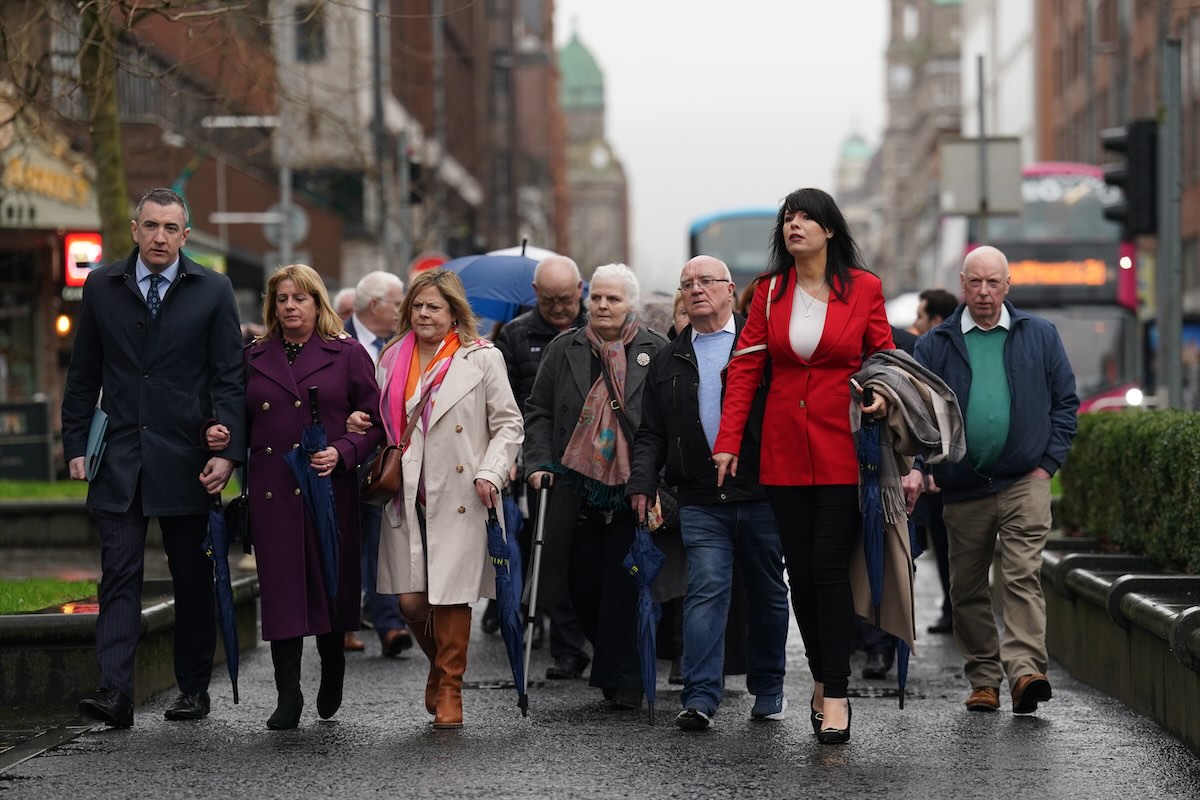
A central element of the London government’s notorious Legacy Act is in breach of international human rights law, a judge has ruled.
Running to more than 200 pages, a summary of the judgment was read to victims’ families and campaigners in the packed courtroom over a two-hour period on Wednesday morning.
Justice Colton told the High Court in Belfast it was a “very difficult and complex case”.
Dealing with the issue of an amnesty being offered to perpetrators of war crimes if they co-operate with a new body set up by the Act, the ‘Independent Commission for Reconciliation and Information Recovery’ the judge noted: “There is no evidence that the granting of immunity under the Act will in any way contribute to reconciliation in Northern Ireland; indeed, the evidence is to the contrary.”
The judge said victims will have no say in applications for amnesties which could be made at the last minute by perpetrators facing the threat of imminent prosecution.
Those provisions of the Act are incompatible with Articles 2 and 3 of the European Convention on Human Rights (ECHR), as well as Article 2 of the Windsor Framework, and should be disapplied, he confirmed.
The court also ruled that sections of the legislation shutting down recent conflict-related civil actions should also be scrapped.
In a legal battle which could reach the Supreme Court, proceedings issued by Martina Dillon, John McEvoy and Lynda McManus and Teresa Jordan were among the lead cases.
Ms Dillon’s 45-year-old husband, Seamus, was shot dead in a loyalist attack at the Glengannon Hotel in Dungannon, County Tyrone, in 1997.
Mr McEvoy survived a loyalist shooting on the Thierafurth Inn in Kilcoo, County Down, in 1992 which claimed the life of 42-year-old Peter McCormack.
Ms McManus’s father, James, was among those wounded in the Sean Graham bookmakers massacre earlier in the same year. Five people were murdered when loyalist gunmen opened fire inside the betting shop on the Ormeau Road in south Belfast.
Legal action was also taken by Teresa Jordan, the mother of IRA Volunteer Pearse Jordan, who was shot dead by an RUC man on Belfast’s Falls Road in November 1992.
With two members of the RUC previously reported to prosecutors for suspected perjury and perverting the course of justice offences, the Act would prevent them from facing potential charges or trial.
Justice Colton ruled that the bar on any criminal investigation, prosecution or punishment of offenders unlawfully breached the human rights of the dead man’s mother, Teresa Jordan.
During the eight-day hearing, the court was told the Act has subjected all of the victims to further secondary trauma by closing down their hopes of ever securing justice.
The new law is flawed, legally offensive and “legitimises” killings carried out by British soldiers who can “triumphantly” glorify their crimes without remorse or fear of prosecution, the court heard.
The Act is strongly opposed by all of the North’s main political parties, the Dublin government, US politicians and human rights groups.
While the court did not dismiss the possibility that the supposed new reconciliation body could carry out human rights compliant investigations, and a May deadline still looms for ongoing inquests, the ruling should already be enough to ensure the legislation will be scrapped when a change of government takes place in London.
As well as ending damning revelations of its actions during the conflict, such as the murder of GAA official Sean Brown in 1997, the British government has struggled to cut down on compensation payouts, such as the “significant” settlements reached this week with two victims of collusion, John Toland and James Loughrey, with ‘no admission of liability’ by the Crown Forces.
Mrs Dillon, whose partner is another suspected victim of a collusion killing, said it had been a “long 26 years”.
“ I ain’t going nowhere. No government and no court is going to put me down. I think my husband is entitled to truth and justice and that is the last and only thing I can give him,” she said.
![[Irish Republican News]](https://republican-news.org/graphics/title_gifs/rn.gif)
![[Irish Republican News]](https://republican-news.org/graphics/title_gifs/harp.gif)

